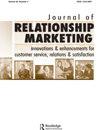消费者依恋类型对康复后满意行为的调节作用
Q2 Business, Management and Accounting
引用次数: 0
摘要
本文章由计算机程序翻译,如有差异,请以英文原文为准。
Moderating Role of Consumers’ Attachment Style on Post-Recovery Satisfaction Behavior
Abstract This study examines the moderating role of consumers’ attachment anxiety and attachment avoidance, on the relationship between recovery satisfaction and their behavior after service recovery. This study analyzes the moderating effect of consumers’ attachment styles to explain the differences in their behavior after service recovery efforts, which has not been explored previously. Primary data was collected from hand-phone users, and the effect of consumers’ attachment styles was examined in the context of the telecommunication sector. Findings indicate that consumers high in attachment anxiety were more likely to repurchase but not to engage in positive word-of-mouth after recovery satisfaction. Attachment avoidance did not impact consumers’ behavioral intentions. In addition, the interaction of anxiety and avoidance positively influenced word-of-mouth intentions upon satisfaction with recovery efforts. However, the interaction did not affect repurchase intentions. This study provides insight into how consumer’s attachment style influences their positive behavioral intentions after recovery satisfaction. We present segment-specific relationship marketing strategies that can aid service providers in managing service recoveries and minimizing the adverse effects of service failures on customer retention.
求助全文
通过发布文献求助,成功后即可免费获取论文全文。
去求助
来源期刊

Journal of Relationship Marketing
Business, Management and Accounting-Marketing
CiteScore
10.20
自引率
0.00%
发文量
7
期刊介绍:
The Journal of Relationship Marketing is a quarterly journal that publishes peer-reviewed (double-blind) conceptual and empirical papers of original works that make serious contributions to the understanding and advancement of relationship and marketing theory, research, and practice. This academic journal is interdisciplinary and international in nature. Topics of interest (not limited to): Evolution and life cycle of RM; theoretical and methodological issues in RM; types of RM, networks and strategic alliances; internal communication, quality, trust, commitment, satisfaction, loyalty, and dissolution in RM; applications of RM in different disciplines and industries; international perspectives in RM; RM strategies in services economy, higher education, and e-commerce; RM, technology, and the Web; profitability and RM; case studies and best practices in RM. If you are interested in becoming an ad-hoc reviewer, please e-mail a brief statement indicating your area of expertise and interest along with a copy of your CV.
 求助内容:
求助内容: 应助结果提醒方式:
应助结果提醒方式:


